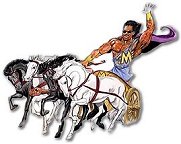
MYTH MAN'S ATALANTA - MAIN PAGE
ALL ABOUT THE FAMOUS HUNTRESS,
WITH A WEALTH OF QUALITY PICTURES
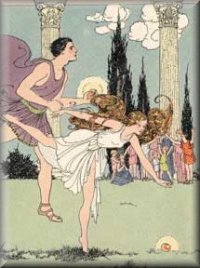
| Atalanta was a stunningly beautiful woman and many princely suitors from all over Greece came to ask for her hand in marriage. |
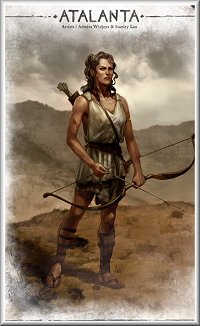 CLICK TO ENLARGE |
| She was very swift and used to surpass men in racing, and once she even won a wrestling match against a man named Peleus. |
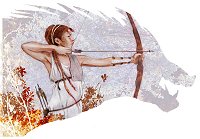 CLICK TO ENLARGE |
| Meleager gave the Calydonian Boar's skin to Atalanta, since she had struck the first blow. |
 CLICK TO ENLARGE |
| Word of her beauty and bravery spread and many princely suitors sought her in marriage. |
 CLICK TO ENLARGE 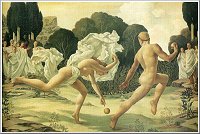 CLICK TO ENLARGE 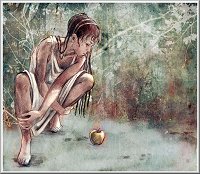 CLICK TO ENLARGE |
Atalanta was the swiftest runner of her time, surpassing
the most fleet-footed men in racing. A woman way ahead of her time, she could
defeat men in wrestling, went along on the voyage with Jason and the Argonauts in their
Quest for the Golden Fleece, and played an active part in killing the feared Calydonian Boar.
Atalanta was also a stunningly beautiful woman and many princely suitors from
all over Greece came to ask for her hand in marriage.
No way. Atalanta had vowed to remain husbandless until she died, and would
challenge any potential suitor to a foot race - If she lost she would become his
wife...if the man was defeated in the race he would lose his life!
Needless to say, many suitors were killed by her, until Aphrodite, the goddess
of Love, got involved...
The identity of Atalanta's parents is in dispute, but whoever they were, the
king and queen of Arcadia passionately desired a son above all else.
They were terribly disappointed when Atalanta was born, and made no secret of
it.
Distraught because she was a girl, the clueless king ordered one of his servants
to kill and dispose of the unwanted baby.
Reluctantly, the servant obeyed his king, but he didn't have the heart to slay
the helpless child. Instead he chose to abandon her in the forest, exposing her
to the elements to die somewhere in
Arcadia.
But she survived, for a she-bear appeared and kept her warm and suckled
her until some hunters found the baby girl and brought her to their village to
raise as their own.
The hunters named her Atalanta, recognizing how special she was - after all, a
giant bear had suckled and cared for her, when by all logic she should have
perished in the wild.
When she grew older, the hunters made her a bow and arrows, and taught her how
to shoot with great expertise. They gave her a light spear, and showed her how
to properly yield it and how to hurl it at the game or at an enemy.
Then they took her with them on their hunting expeditions, and before long
Atalanta knew that this was the life for her. There was nothing in the world
that pleased her so much as roaming through the woods and running after the deer
and other wild animals.
Atalanta grew to become a most beautiful woman, very tall and graceful and was
known throughout her homeland of Arcadia as a fleet-footed huntress. She vowed to
never take a husband, choosing to remain a virgin.
She
was very swift and used to surpass all the men in racing. Her arms grew strong
and her aim became unerring - she never missed her mark with neither her spear
nor her arrow.
Once she even won a
wrestling match against Peleus - who later became the great warrior Achilles'
father - during the games that were held in honour of King Pelias.
Thus living and hunting in the wilderness she remained always armed to the
teeth, ready
to defend herself at all times. On one occasion the foolish Centaurs Rhoecus and Hylaeus tried to
rape her in a drunken frenzy, and the brave beauty shot them down and killed them.
Another time, the goddess Artemis grew angry at King Oeneus of Calydon and sent a
boar of enormous size and strength, which prevented the land from being sown,
destroying and terrorizing both cattle and people.
In order to get rid of this ravaging beast, King Oeneus assembled the noblest
men of Greece, who became known as the Calydonian Hunters, and promised to give
the boar's skin as a prize to the warrior who should kill it.
Among these noble men came also Atalanta who shortly before had travelled with
the Argonauts in their successful voyage to bring back to Greece the Golden
Fleece.
However the Arcadians' King Cepheus of Tegea and Ancaeus, were chauvinistic and
disdained going hunting with a woman. Oeneus's son Meleager, being in love with
Atalanta though he himself was already married, made the unwilling men permit
Atalanta to take part in the hunt.
Needless to say, Atalanta was the first hunter to wound the boar with an arrow and
then the hunter Amphiaraus shot it in the eye and finally Meleager dispatched it with a
mighty stab with his sword.
Meleager gave the Calydonian Boar's skin to Atalanta, since she had struck
the first blow. This gallant gesture totally ticked off the chauvinists, who
thought that a woman had no business hunting with them, let alone showing them
up with her skills!
When the sons of Thestius insisted that the Boar's skin belonged to them, things
got real ugly - A ferocious and violent battle ensued, with the final result
being that Meleager slew both of them.
Eventually this led to Meleager's own death, but we're here to study Atalanta.
Word of her beauty and bravery spread and many princely suitors sought her in
marriage. Not only had she participated courageously in the Calydonian Boar
Hunt, but also she had taken part in the legendary voyage with Jason and the
Argonauts on their Quest for the Golden Fleece. What a superwoman!
Not to mention the fact that she was drop-dead gorgeous!
Atalanta had other ideas.
She informed her father that she had chosen to remain a virgin and unsullied,
and insisted that her father set up a
contest with the following rules:
Each of Atalanta's suitors would race unarmed
and she would pursue them with a weapon.
She would give them a generous head start, a full one hundred paces, just to be
fair. That's how confident she was in her capabilities.
Were she to be defeated, she would marry the suitor. However, If Atalanta overtook him within
the limits of the race, she then would kill him and affix his head up in the stadium.
This would serve notice to other potential suitors to think twice before
challenging fleet Atalanta to a foot race!
A whole lot of cowardly suitors abruptly changed their amorous minds upon
hearing these conditions, but there was a constant stream of dreamers who did
not believe that a mere woman - and a doll at that! - could outrace them.
Poor fools!
Many perished in this cruel contest, until a man called Melanion, or as others say
Hippomenes, appealed to the goddess of Love, Aphrodite, to help him land
Atalanta as wife.
Aphrodite was irked that Atalanta was not moved by any feelings of love, and
was justified in feeling
that she had failed in her job. That wouldn't do now, would it? So the goddess
of Love decided to help Melanion/Hippomenes win the hand of Atalanta in marriage.
She gave him three magical golden apples with instructions to scatter them on the
ground when Atalanta gained on him.
As Melanion was being pursued he threw down
one at a time the golden apples that he had received from Aphrodite, and Atalanta, slowing
down to pick up the irresistible dropped fruit, was beaten in the race.
Melanion took home his new wife but in his excitement he forgot the role that
Aphrodite played and did not pay her proper thanks. Bad move.
The peeved goddess of Love decided to punish the ungrateful man, so while he was
sacrificing on Mount Parnassus to Zeus to celebrate his victory, Aphrodite
inflamed him with desire and he lay with Atalanta in the temple while the sacred
images turned away their eyes.
Some mythographers claim that Atalanta and her lover lay at the temple of
Cybelle.
In any case,
Zeus or Cybelle saw this profane act in the hallowed temple and, filled with fury, instantly turned them
into lion and lioness.
Mortified to be transformed into wild beasts , the new couple fled into the
woods. Some say that they were eventually slain by the same hunters who once
roamed the familiar hunting grounds with them.
Parentage: There are three version of her parents:
1) Schoeneus & unknown
2) Iasus & Clymene
3) Maenalus & unknown
With either Melanion, Meleager, Ares or Hippomenes she had a son named
Parthenopaeus, who was one of the famous warriors known as the Seven Against
Thebes.
Her name derives from the Greek Αταλαντη (Atalante) meaning "equal in
weight", which is derived from αταλαντος (atalantos), a word related to ταλαντον (talanton),
meaning "a scale or balance".
In mythology,
Atalanta no doubt was a parallel (and not-quite-as-important) form of Artemis, the
renowned Olympian goddess of the hunt.
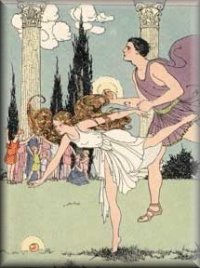
| She could defeat men in wrestling, went along on the voyage with Jason and the Argonauts in their Quest for the Golden Fleece, and played an active part in killing the feared Calydonian Boar. |
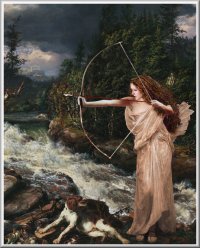 CLICK TO ENLARGE |
| Thus living and hunting in the wilderness she remained always under arms, ready to defend herself. |
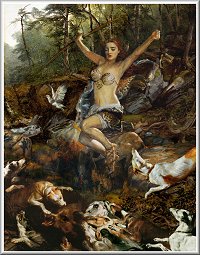 CLICK TO ENLARGE |
| King Oeneus assembled the noblest men of Greece, who became known as the Calydonian Hunters. |
 CALYDONIAN BOAR HUNT |
| Were she to be defeated, she would marry the suitor. If she overtook him within the limits of the race, she should kill him and fix his head up in the stadium, to serve as notice to other potential suitors. |
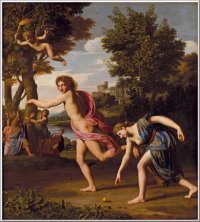 CLICK TO ENLARGE  CLICK TO ENLARGE 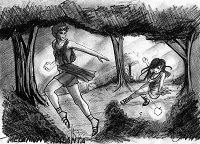 CLICK TO ENLARGE |
[HOME]
[MYTHOLOGY'S
EFFECTS ON MODERN SOCIETY] [OLYMPIANS]
Web, myth narration and graphics created and maintained by Nick Pontikis
Copyright © 1995 Nick Pontikis
Thanasi's Olympus Greek
Restaurant
Copyright 1999 mythman.com
greekmythologytoday.com
mythmaniacs.com
The Myth Man persona copyright 1988 Nick Pontikis
